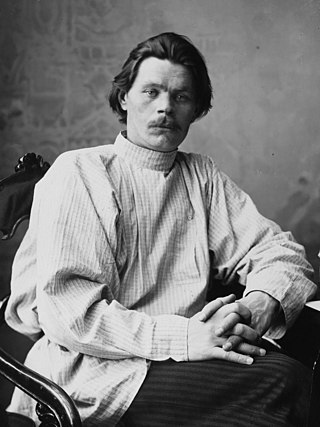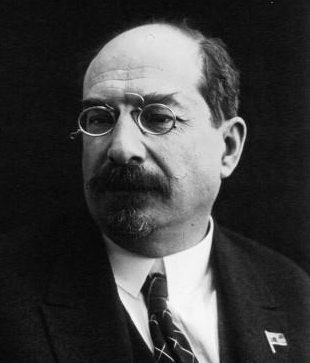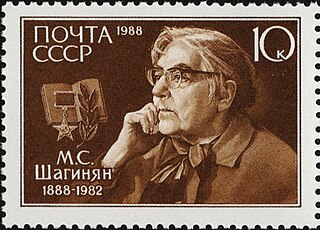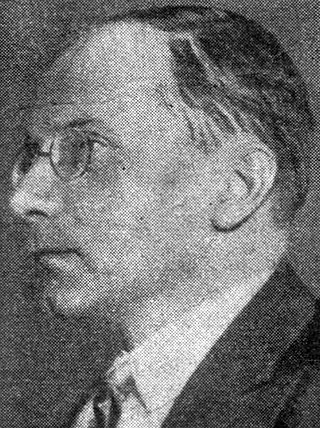Related Research Articles

Socialist realism is a style of idealized realistic art that was developed in the Soviet Union and was the official style in that country between 1932 and 1988, as well as in other socialist countries after World War II. Socialist realism is characterized by the depiction of communist values, such as the emancipation of the proletariat. Despite its name, the figures in the style are very often highly idealized, especially in sculpture, where it often leans heavily on the conventions of classical sculpture. Although related, it should not be confused with social realism, a type of art that realistically depicts subjects of social concern, or other forms of "realism" in the visual arts. Socialist realism was made with an extremely literal and obvious meaning, usually showing an idealized USSR. Socialist realism was usually devoid of complex artistic meaning or interpretation.

Alexei Maximovich Peshkov, popularly known as Maxim Gorky, was a Russian and Soviet writer and socialist political thinker and proponent. He was nominated five times for the Nobel Prize in Literature. Before his success as an author, he travelled widely across the Russian Empire changing jobs frequently, experiences which would later influence his writing.

Russian literature refers to the literature of Russia and its émigrés and to Russian-language literature. The roots of Russian literature can be traced to the Middle Ages, when epics and chronicles in Old East Slavic were composed. By the Age of Enlightenment, literature had grown in importance, and from the early 1830s, Russian literature underwent an astounding golden age in poetry, prose and drama. Romanticism permitted a flowering of poetic talent: Vasily Zhukovsky and later his protégé Alexander Pushkin came to the fore. Prose was flourishing as well. Mikhail Lermontov was one of the most important poets and novelists. The first great Russian novelist was Nikolai Gogol. Then came Ivan Turgenev, who mastered both short stories and novels. Fyodor Dostoevsky and Leo Tolstoy soon became internationally renowned. Other important figures of Russian realism were Ivan Goncharov, Mikhail Saltykov-Shchedrin and Nikolai Leskov. In the second half of the century Anton Chekhov excelled in short stories and became a leading dramatist. The beginning of the 20th century ranks as the Silver Age of Russian poetry. The poets most often associated with the "Silver Age" are Konstantin Balmont, Valery Bryusov, Alexander Blok, Anna Akhmatova, Nikolay Gumilyov, Sergei Yesenin, Vladimir Mayakovsky, and Marina Tsvetaeva. This era produced some first-rate novelists and short-story writers, such as Aleksandr Kuprin and Nobel Prize winners Ivan Bunin, Leonid Andreyev, Fyodor Sologub, Yevgeny Zamyatin, Alexander Belyaev, Andrei Bely and Maxim Gorky.

Anatoly Vasilyevich Lunacharsky was a Russian Marxist revolutionary and the first Bolshevik Soviet People's Commissar (Narkompros) responsible for the Ministry of Education as well as an active playwright, critic, essayist and journalist throughout his career.

Andrei Aleksandrovich Zhdanov was a Soviet politician and ideologue. He has been described as the Soviet Union's "propagandist-in-chief" in the 1940s, and was responsible for developing the Soviet cultural policy, the Zhdanov Doctrine, which remained in effect until the death of Joseph Stalin. Zhdanov was considered Stalin's most likely successor but died before him.

Yury Karlovich Olesha was a Russian and Soviet novelist. He is considered one of the greatest Russian novelists of the 20th century, one of the few to have succeeded in writing works of lasting artistic value despite the stifling censorship of the era. His works are delicate balancing acts that superficially send pro-Communist messages but reveal far greater subtlety and richness upon a deeper reading. Sometimes, he is grouped with his friends Ilf and Petrov, Isaac Babel, and Sigismund Krzhizhanovsky into the Odessa School of Writers.
Soviet nonconformist art was Soviet art produced in the former Soviet Union outside the control of the Soviet state started in the Stalinist era, in particular, outside of the rubric of Socialist Realism. Other terms used to refer to this phenomenon are Soviet counterculture, "underground art" or "unofficial art".

Mikhail Aleksandrovich Lifshitz was a Soviet Marxian literary critic and philosopher of art who had a long and controversial career in the former Soviet Union. In the 1930s, he strongly influenced Marxist views on aesthetics while being a close associate of György Lukács. He also published important compilations of early Marxist literature on the role of art. In 1975, he was elected as a full member of the USSR Academy of Arts.

Russian nationalism is a form of nationalism that promotes Russian cultural identity and unity. Russian nationalism first rose to prominence as a Pan-Slavic enterprise during the 19th century Russian Empire, and was repressed during the early Bolshevik rule. Russian nationalism was briefly revived through the policies of Joseph Stalin during and after the Second World War, which shared many resemblances with the worldview of early Eurasianist ideologues.

Socialist realism in Poland was a socio-political and aesthetic doctrine enforced by the pro-Soviet communist government in the process of Stalinization of the post-war Polish People’s Republic. The official policy was introduced in 1949 by a decree of the Polish United Workers' Party minister Włodzimierz Sokorski. As in all Soviet-dominated Eastern Bloc countries, Socialist realism became the main instrument of political control in the building of totalitarianism in Poland. However, the trend never became truly dominant. Following Stalin's death, and especially from 1953 on, critical opinions were heard with increasing frequency. Finally, as part of the Gomułka political thaw from within the Polish United Workers' Party, the entire doctrine was officially given up in 1956. Following Bierut's death on March 12, 1956, and the subsequent De-Stalinization of all People's Republics, Polish artists, writers and architects started abandoning it around 1956.

Marietta Sergeevna Shaginyan was a Soviet writer, historian and activist of Armenian descent. She was one of the "fellow travelers" of the 1920s led by the Serapion Brotherhood and became one of the most prolific communist writers experimenting in satirico-fantastic fiction.

Boris Efimovich Groys is an art critic, media theorist, and philosopher. He is currently a global distinguished professor of Russian and Slavic studies at New York University and senior research fellow at the Karlsruhe University of Arts and Design in Karlsruhe, Germany. He has been a professor of aesthetics, art history, and media theory at the Karlsruhe University of Arts and Design/Center for Art and Media in Karlsruhe and an internationally acclaimed professor at a number of universities in the United States and Europe, including the University of Pennsylvania, the University of Southern California and the Courtauld Institute of Art London.

Aleksandr Konstantinovich Voronsky was a prominent humanist Marxist literary critic, theorist and editor of the 1920s, disfavored and purged in 1937 for his work with the Left Opposition and Leon Trotsky during and after the October Revolution. Voronsky's writings were hidden away in the Soviet Union, until his autobiography, Waters of Life and Death, and anthology, Art as the Cognition of Life were translated and published in English.
Boris Viktorovich Tomashevsky was a Russian Formalist literary critic, theorist of poetry, textual analyst, historian of Russian literature, Pushkin scholar, translator, and writer. He was a member of the Moscow linguistic circle, the OPOJAZ and the Union of Soviet Writers.

György Lukács was a Hungarian Marxist philosopher, literary historian, literary critic, and aesthetician. He was one of the founders of Western Marxism, an interpretive tradition that departed from the Soviet Marxist ideological orthodoxy. He developed the theory of reification, and contributed to Marxist theory with developments of Karl Marx's theory of class consciousness. He was also a philosopher of Leninism. He ideologically developed and organised Lenin's pragmatic revolutionary practices into the formal philosophy of vanguard-party revolution.

Anatoly Vladimirovich Sofronov was a Soviet Russian writer, poet, playwright, scriptwriter, editor and literary administrator, the Union of Soviet Writers' secretary in 1948-1953. Sofronov was a Stalin Prize laureate and a recipient of the Order of the Hero of Socialist Labour (1981).

Aleksei Ivanovich Stetskii was a Russian Soviet politician, journalist and official and propagandist of the All-Union Communist Party (Bolsheviks).
The anti-cosmopolitan campaign was a thinly disguised antisemitic campaign in the Soviet Union which began in late 1948. Jews were characterized as rootless cosmopolitans and were targeted for persecution.
This is a select bibliography of post World War II English language books and journal articles about Stalinism and the Stalinist era of Soviet history. Book entries have references to journal reviews about them when helpful and available. Additional bibliographies can be found in many of the book-length works listed below.

Ivan Mikhailovich Gronsky was a Russian Soviet public figure, journalist, literary critic and Communist Party official, who survived long imprisonment in the Gulag.
References
- ↑ unive.it The University of Venice https://www.https://www.unive.it/data/persone/24613644; The University of Venice . Retrieved 2022-03-10.
{{cite web}}: Check|url=value (help); Missing or empty|title=(help) - ↑ "Late Stalinism by Evgeny Dobrenko". Pushkin House. Retrieved 2021-12-16.
- ↑ Felix Light. "Evgeny Dobrenko's 'Late Stalinism: The Aesthetics of Politics' Recasts 20th Century History". The Moscow Times. Retrieved 2021-12-16.